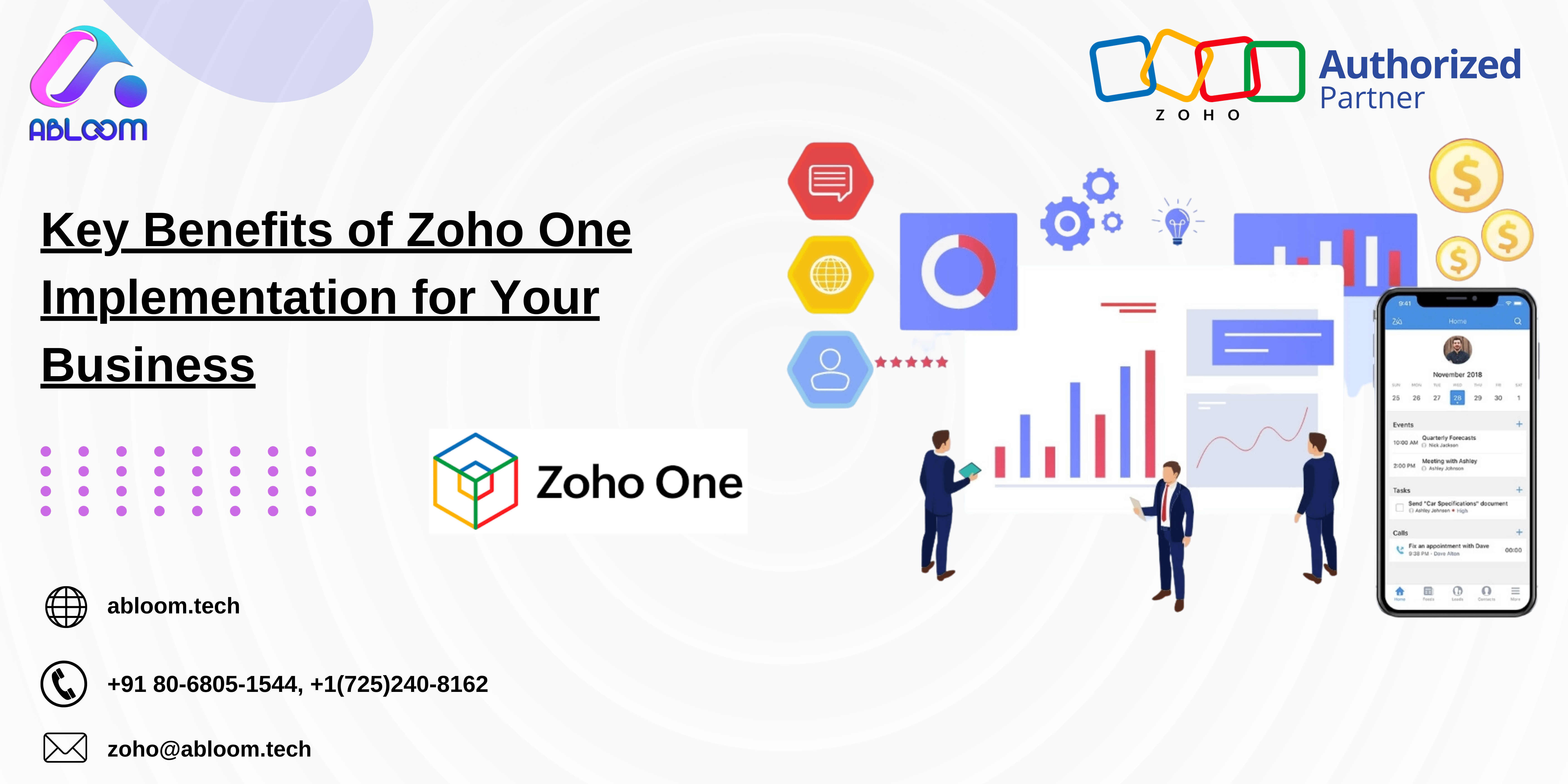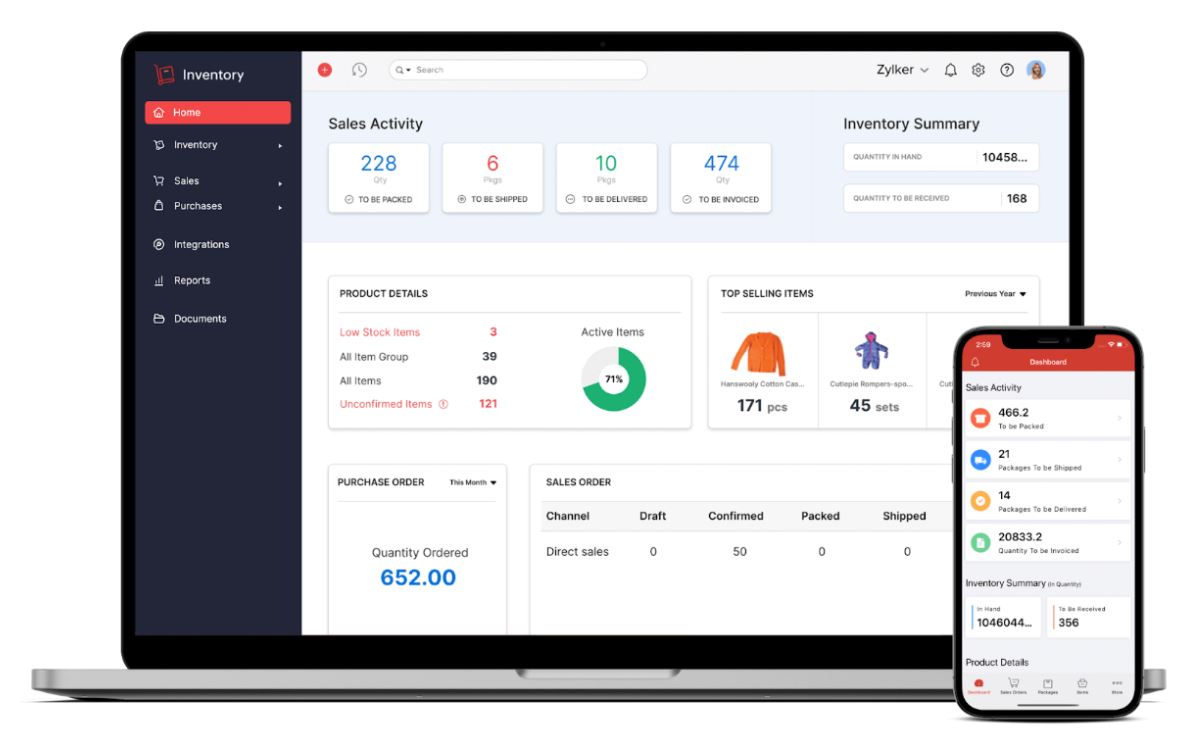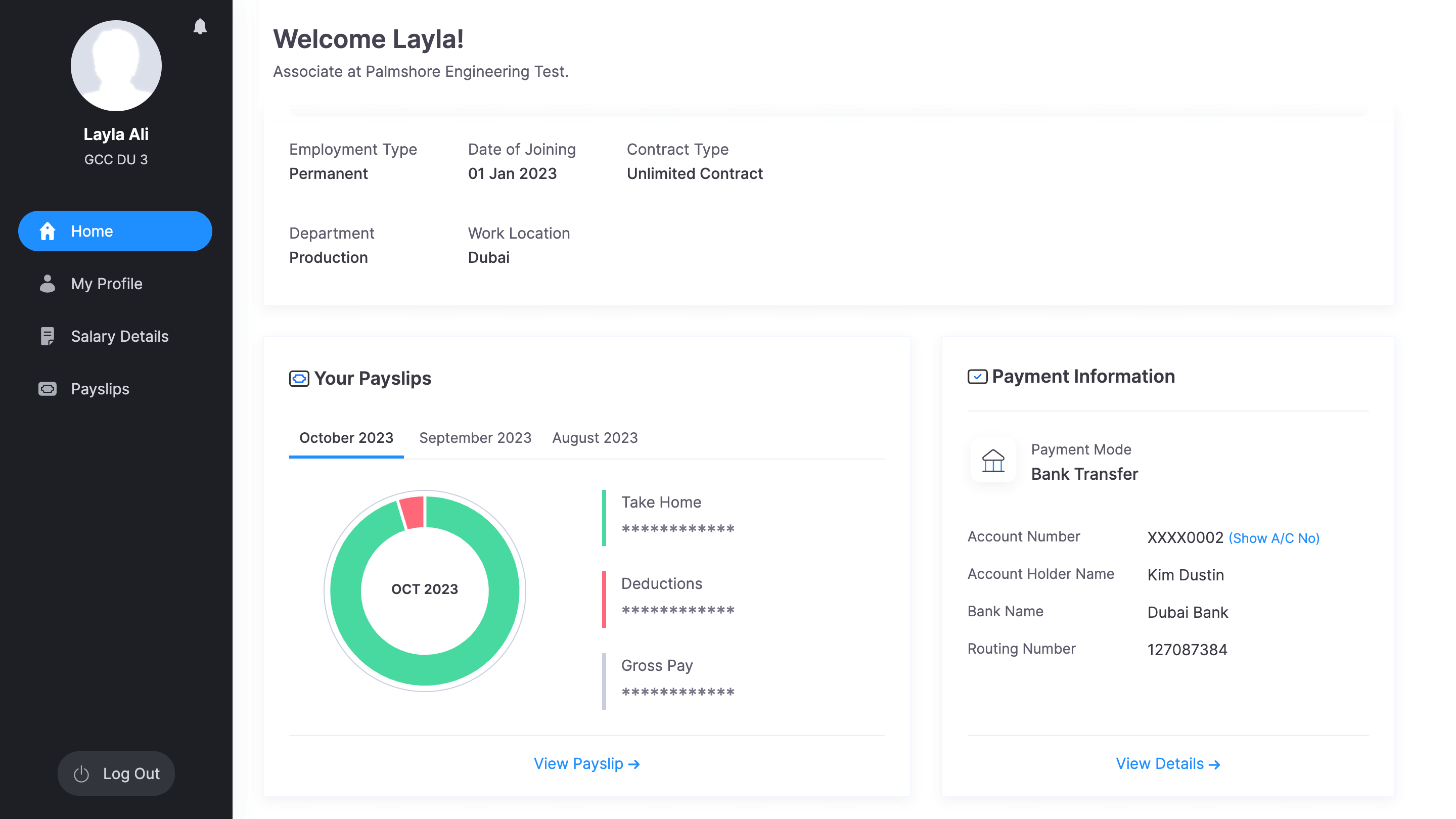Zoho vs Competitors: Choosing the Right CRM for Your Business
Introduction:
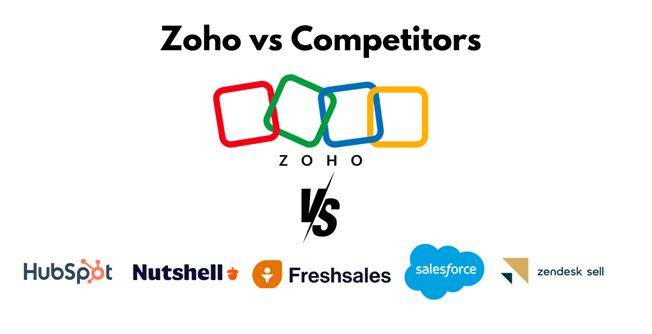
In today’s dynamic business operations landscape, Customer Relationship Management (CRM) tools have become essential for companies looking to improve their efficiency. These tools help streamline the customer management process and better understand customer needs, preferences, and behavior. It also enhances customer interactions. Zoho CRM stands out as a formidable player among the myriad of CRM options available. Let’s explore the topic of this blog post in detail. We’ll examine the subject thoroughly and provide informative insights. A comparison between Zoho and its competitors shows why Zoho might be the right choice for your business.
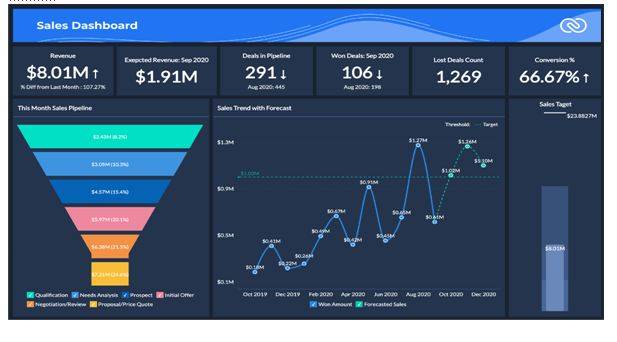
Zoho CRM is a cloud-based platform. With features ranging from lead management to analytics, Zoho CRM Consulting Partner provides a holistic solution for businesses of all sizes. Its user-friendly interface, customization options, and affordable pricing have made it popular for startups and established enterprises.
- Contact and Lead Management:
- Zoho CRM provides a centralized database for storing and managing customer information, leads, and contacts.
- Users: It is possible to collect leads from multiple sources, such as web forms, social media platforms, and email campaigns.
- Sales Automation:
- Automation features automate routine tasks, reducing manual effort and improving efficiency.
- Sales automation includes lead assignment, workflow automation, and follow-up reminders.
- Pipeline Management:
- The platform facilitates its users to create and manage their content efficiently. Their content is efficient. Sales pipelines visually represent the sales process.
- Sales teams can track the progress of deals through different stages and prioritize high-value opportunities.
- Workflow Automation:
- Zoho CRM enables the creation of custom workflows to automate business processes based on predefined rules and triggers.
- Integration Capabilities:
- Zoho CRM integrates seamlessly with various third-party applications, allowing users to connect their CRM with email, marketing, accounting, and more tools.
- Integration with other Zoho applications creates a unified ecosystem for managing various business functions.
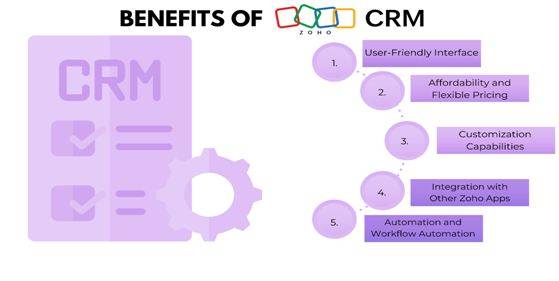
- User-Friendly Interface:
Zoho CRM boasts an intuitive and user-friendly interface. The aim is to ensure that people with different levels of technical proficiency can use the product. Clean design and straightforward navigation contribute to a seamless user experience, reducing the learning curve for new users.
- Affordability and Flexible Pricing:
Zoho understands the diverse needs of businesses. We provide our customers with several pricing options to choose from. It can cater to different budgets. Whether you are a small business looking for a cost-effective solution or a large enterprise needing advanced features, Zoho’s pricing structure ensures scalability without breaking the bank.
- Customization Capabilities:
One of Zoho CRM’s standout features is its high level of customization. Businesses can customize the platform according to their specific needs and preferences. This means they can modify the platform to match their requirements and ensure it is tailored to their unique business needs—particular workflows and requirements. From custom fields to personalized dashboards, Zoho CRM empowers users to create an environment that aligns perfectly with their unique business processes.
- Integration with Other Zoho Apps:
Zoho CRM seamlessly integrates with other Zoho applications, creating a unified ecosystem for your business operations. Integration with Zoho Books, Zoho Campaigns, and Zoho Analytics, among others, ensures a smooth flow of information across different departments.
- Workflow Automation:
Zoho CRM automates repetitive tasks, saving time and reducing the chances of errors. The platform’s workflow automation feature allows businesses to create and manage complex workflows, enhancing efficiency and ensuring critical processes are executed flawlessly.
Competitors’ Disadvantages:
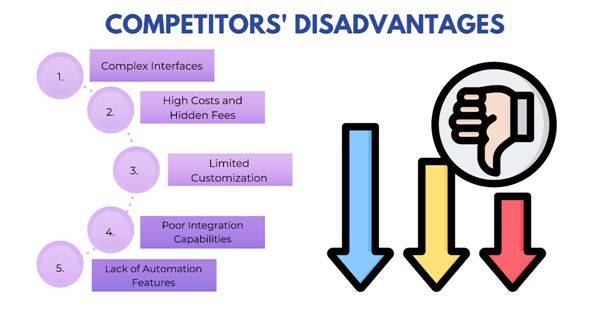
Now, let’s examine some of the disadvantages associated with Zoho CRM’s competitors.
- Complex Interfaces:
Some CRM competitors may have steeper learning curves due to complex interfaces and intricate features. This can result in delays in implementation and hinder user adoption, impacting overall productivity.
- High Costs and Hidden Fees:
Specific CRM solutions come with high upfront costs and may include hidden fees for additional features or user licenses. This lack of transparency in pricing can strain budgets and lead to unexpected expenses down the line.
- Limited Customization:
While some CRM platforms offer customization options, they may need to match Zoho CRM’s flexibility. Limited customization can be a significant drawback for businesses with unique workflows that require tailored solutions.
- Poor Integration Capabilities:
Integration is crucial for a seamless business operation, and some CRM competitors may need to catch up. The inability to integrate with other essential business tools may lead to data silos and hinder collaboration among teams.
- Lack of Automation Features:
Automation is a critical element of modern CRM systems, and competitors needing robust automation features may need to catch up in terms of efficiency. Manual processes are not only time-consuming but also prone to errors.
Making the Right Choice for Your Business
Choosing the right CRM for your business depends on various factors, including your budget, business size, industry requirements, and specific feature needs. Here are some key considerations:
- Budget:
Zoho CRM is known for its affordability, “This makes it a compelling choice for small and medium-sized enterprises.” with limited budgets. Evaluate your budget constraints. Decide on the amount you are willing to invest in a CRM.” Consider the initial setup costs and ongoing subscription fees, training, and potential customization expenses.
- Scalability:
If your business is poised for rapid growth, Salesforce or Microsoft Dynamics 365 might be more scalable options, although at a potentially higher cost. Consider the scalability of the CRM. Make sure that the solution you choose can scale with your business. And adapt to changes in user numbers, data volume, and additional features.
- Features:
Assess your business requirements carefully. Zoho CRM offers a diverse set of features to its users. That is comprehensive and user-friendly. But the right choice depends on your organization’s specific needs. Assess your business needs clearly for making the appropriate choice with Zoho CRM’s varied features for varied business needs.
- Integration:
Consider your existing software stack. Microsoft Dynamics 365 might be a natural fit if your business heavily relies on Microsoft products.
Zoho is a totally business management software to manage all your business functions. It has great integration capabilities with different business applications.
Conclusion:
In the competitive realm of CRM solutions, Zoho CRM emerges as a standout choice for businesses seeking a reliable, user-friendly, and cost-effective platform. Its extensive customization options, integration capabilities, and automation allow companies of all sizes to use the tool’s features in various ways.
While competitors may offer certain features, they often come with disadvantages such as complex interfaces, high costs, limited customization, poor integration capabilities, and a lack of automation features. These drawbacks can impede the smooth functioning of businesses and hinder their ability to adapt to evolving market demands.
When choosing a CRM for your business, it is crucial to consider the immediate needs and the long-term scalability and flexibility of the selected solution. With its array of benefits and minimal disadvantages, Zoho CRM stands out as a compelling Business seeking to improve its customer relationship management. Businesses may find this option to be a suitable choice. Make an informed decision that aligns with your business goals and propel your organization toward success with the right CRM solution.



